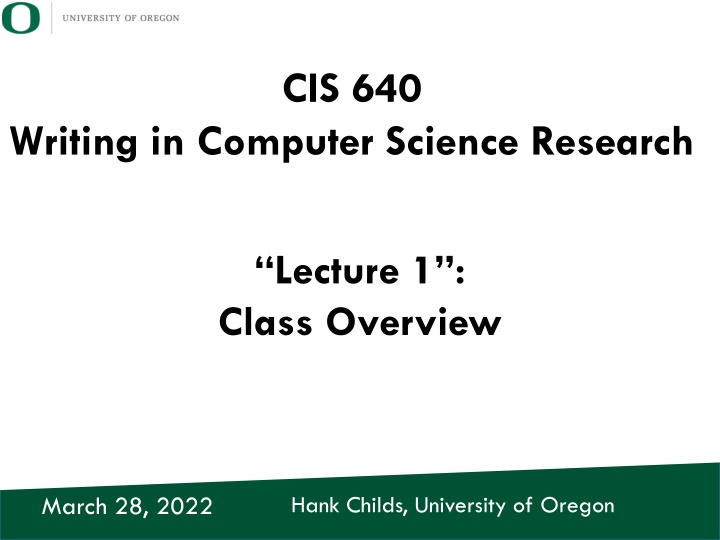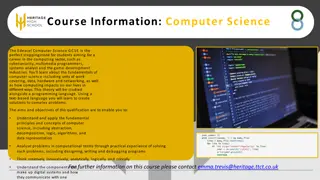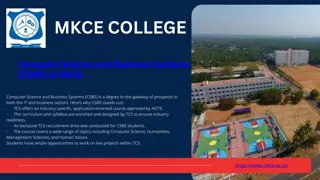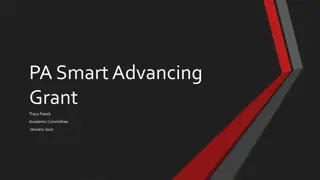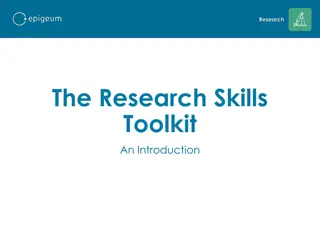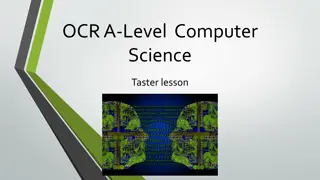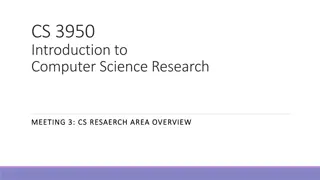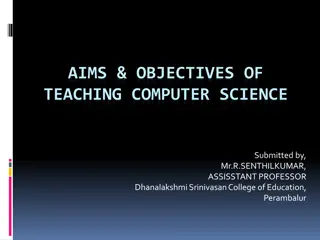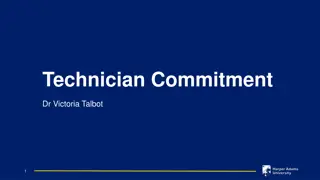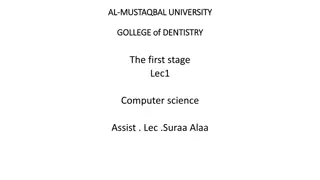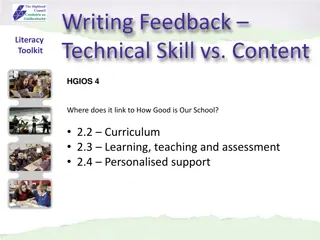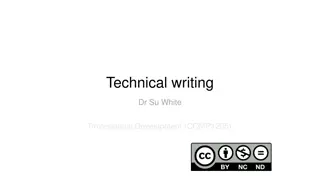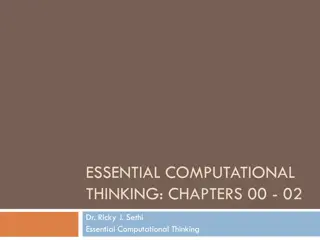Writing in Computer Science Research: Enhancing Technical Writing Skills
This course overview covers the main objectives, class structure, and learning outcomes of a Computer Science Research Writing course focused on developing students' writing abilities, providing constructive criticism, and applying technical writing concepts to research papers in a workshop format. Emphasis is placed on improving sentence-level writing, organizing research papers effectively, and engaging with authoritative texts on technical writing.
Download Presentation

Please find below an Image/Link to download the presentation.
The content on the website is provided AS IS for your information and personal use only. It may not be sold, licensed, or shared on other websites without obtaining consent from the author.If you encounter any issues during the download, it is possible that the publisher has removed the file from their server.
You are allowed to download the files provided on this website for personal or commercial use, subject to the condition that they are used lawfully. All files are the property of their respective owners.
The content on the website is provided AS IS for your information and personal use only. It may not be sold, licensed, or shared on other websites without obtaining consent from the author.
E N D
Presentation Transcript
CIS 640 Writing in Computer Science Research Lecture 1 : Class Overview Hank Childs, University of Oregon March 28, 2022
Disclaimers I love teaching this class We have had some great groups Enjoyed our class time Learned a lot Some of these slides are harsh sorry ( Do this or No Pass )
Canvas These slides are posted on the class Canvas page The syllabus is on Canvas That is all we will use Canvas for
Course Outcomes The main goal of this course is for students develop their writing ability for computer science research. Students will submit writing samples, and provide and accept constructive criticism with their peers, in a workshop format. Students also may read and discuss authoritative texts on technical writing. Throughout the term, students will apply what they learn to their writing.
Course Outcomes The main goal of this course is for students develop their writing ability for computer science research. Students will submit writing samples, and provide and accept constructive criticism with their peers, in a workshop format. Students also may read and discuss authoritative texts on technical writing. Throughout the term, students will apply what they learn to their writing.
Course Outcomes The main goal of this course is for students develop their writing ability for computer science research. Students will submit writing samples, and provide and accept constructive criticism with their peers, in a workshop format. Students also may read and discuss authoritative texts on technical writing. Throughout the term, students will apply what they learn to their writing.
Course Outcomes The main goal of this course is for students develop their writing ability for computer science research. Students will submit writing samples, and provide and accept constructive criticism with their peers, in a workshop format. Students also may read and discuss authoritative texts on technical writing. Throughout the term, students will apply what they learn to their writing.
Learning Outcomes Develop writing skills consistent with producing a research paper in computer science. Most activities will occur in a workshop format. Effective writing at the sentence-level. Organization of a research paper, including important elements of each section in a research paper (for example, the important elements in an introduction, in related work, etc.). Writing from the perspective of the peer review process. This includes both how writing may be interpreted during peer review and the process of peer review itself (conferences and journals).
Learning Outcomes Develop writing skills consistent with producing a research paper in computer science. Most activities will occur in a workshop format. Effective writing at the sentence-level. Organization of a research paper, including important elements of each section in a research paper (for example, the important elements in an introduction, in related work, etc.). Writing from the perspective of the peer review process. This includes both how writing may be interpreted during peer review and the process of peer review itself (conferences and journals).
Learning Outcomes Develop writing skills consistent with producing a research paper in computer science. Most activities will occur in a workshop format. Effective writing at the sentence-level. Organization of a research paper, including important elements of each section in a research paper (for example, the important elements in an introduction, in related work, etc.). Writing from the perspective of the peer review process. This includes both how writing may be interpreted during peer review and the process of peer review itself (conferences and journals).
Learning Outcomes Develop writing skills consistent with producing a research paper in computer science. Most activities will occur in a workshop format. Effective writing at the sentence-level. Organization of a research paper, including important elements of each section in a research paper (for example, the important elements in an introduction, in related work, etc.). Writing from the perspective of the peer review process. This includes both how writing may be interpreted during peer review and the process of peer review itself (conferences and journals).
Course Prerequisite Must be writing something this term PhD students: Typically DRP or Area Exam Could be dissertation or a paper Fellowship proposal MS students: MS thesis Survey paper (did you do a survey for 630 or 631?)
What You Have To Do 1) Attend class Approved reasons for absence will be discussed later 2) Perform course tasks Writing, reviewing, revision (See next slide) 3) Keep on schedule We work as a unit, and we all must keep the schedule Exceptions by permission only Failure to do any of these three will result in a No Pass
Writing and Reviewing Writing 5 submissions of 1-2 pages each Final paper (6500 words) 4 revisions of writing (not collected) Reviewing 12 reviews first 4 submissions each get 3 reviews
Example Plan Week 2: write Introduction section Week 3: receive feedback on Introduction Week 4: write My Method section, revise Introduction Week 5: receive feedback on My Method Week 6: write Experimental Overview section, revise My Method Week 7: receive feedback on Experimental Overview Week 8: write Results section, revise Experimental Overview. Week 9, receive reviews on Results Week 10: write Related Work, revise Results Finals Week: complete Final Paper
Problems with Plan When were Conclusion & Abstract written? Answer: example plan is just a strawman Write ~1300 words every two weeks If you write 800 words every time (4000 words), then you will have a miserable Finals Week (2500 words) If you write 1800 words every time (9000 words), then you will have an easy Finals Week
Final Paper Length: 6500 words This will use all the text from 1st 5 submissions Why 6500 words? approx. word count from IEEE 8 page paper, double column Final paper must be submission quality Due Weds June 8, 1015am
What does submission quality mean? When you submit a paper to a conference or journal, you are expecting 100s of people to read it The author (you) should work hard to make the paper as accessible as possible
Example Assume 100 people read it On average, spend 1h20 reading What if?: Author spends 20 hours improving readability Average reading time drops to 1h5m 1.333*100 = 133 hours 1.08*100 = 108 hours 133-108 = 25 ... the world is better off
More on Submission Quality I review a ton of papers If someone has not done me the courtesy of making my experience as efficient as possible, then it puts me in a bad mood This is a very different setting than writing a term paper for a class (one author, one reader)
4 Reviews Each review must have the following: 5-10 grammatical / wordsmithing suggestions If the writing is great, then 5 If the paper is rough, you stop at 10 3 big picture suggestions on how to improve
Revisions Each revision should take into account reviews and fix all problems We will not collect revisions ... but your final paper should reflect fixes that came from your reviews
Participation Every student will attend lecture and participate in peer review of cohort's writing samples Every student will offer up text for group review
Logistics (1/2) Will be run through EasyChair EasyChair link on class website (I know Canvas is beloved) Reviews must be completed 5 days after assignment Can go on vacation
Logistics (2/2) If you fall behind the minimums at any of these weeks, then you will receive a NP in the course (This class only works if everyone is making steady progress)
How Will We Spend Class Time? Look at writing examples and collectively edit While this seems like it might be uncomfortable, it has been OK so far We are each on a personal journey to become our best writing self Also, I can talk about topics as needed How papers are accepted? What should go in each section? Other?
My Own Personal Writing Story Summary: poor writer as a PhD student, good writer now Observations: writing improves and is easier as you practice I used to hate writing and now _enjoy_ it students often put way too little time into writing since they hate doing it coding is more fun
Anna Karenina Principle All happy families are alike; each unhappy family is unhappy in its own way While each problematic paper is uniquely unhappy, there are common themes We will be collectively identifying unhappy families themes throughout the term
Unhappy Families From Hank (1/3) (1) every sentence reads well, but the whole is a jumbled mess No sense of purpose per paragraph / section Facts appear in random places (2) only makes sense if the reader already knows what you are talking about (3) procrastinate, procrastinate, procrastinate, write hastily and declare done and then get co-authors to fix
Unhappy Families From Hank (1/3) (1) every sentence reads well, but the whole is a jumbled mess No sense of purpose per paragraph / section Facts appear in random places (2) only makes sense if the reader already knows what you are talking about (3) procrastinate, procrastinate, procrastinate, write hastily and declare done and then get co-authors to fix
Unhappy Families From Hank (1/3) (1) every sentence reads well, but the whole is a jumbled mess No sense of purpose per paragraph / section Facts appear in random places (2) only makes sense if the reader already knows what you are talking about (3) procrastinate, procrastinate, procrastinate, write hastily and declare done and then get co-authors to fix
Unhappy Families from Hank (2/3) (4) Writing is overly complicated Example: lots and lots of clauses, Clauses are not well connected leave it to the reader to figure out how they relate say what the subject is at the end of the sentence (5) Writer assumes the reader is as fascinated by the topic as the author and will endure endless details because of their mutual shared fascination
Unhappy Families from Hank (2/3) (4) Writing is overly complicated Example: lots and lots of clauses, Clauses are not well connected leave it to the reader to figure out how they relate say what the subject is at the end of the sentence (5) Writer assumes the reader is as fascinated by the topic as the author and will endure endless details because of their mutual shared fascination
Unhappy Families from Hank (3/3) (6) Writer assumes too much knowledge (7) Writer assumes too little knowledge (8) Writer has not properly digested/synthesized their own work, and expects reader to be excited about learning details and also expect the reader to do this digesting/synthesis on their behalf
Unhappy Families from Hank (3/3) (6) Writer assumes too much knowledge (7) Writer assumes too little knowledge (8) Writer has not properly digested/synthesized their own work, and expects reader to be excited about learning details and also expect the reader to do this digesting/synthesis on their behalf
Unhappy Families from Hank (3/3) (6) Writer assumes too much knowledge (7) Writer assumes too little knowledge (8) Writer has not properly digested/synthesized their own work, and expects reader to so excited about that their work that the reader will do this digesting/synthesis on their behalf
Non-Native Speakers You may consider typing in MS-Word (or similar) This way MS-Word will catch many problems before they make it to your reviews
Pitfalls: Area Exam This class has worked well when Area Exam document is already in progress Not as good for those just starting, unless you can really really devote yourself Typical Area Exam: 20 pages, 6 months of 30 hours/week ~40 hours of effort per page This class: 8 pages, 10 weeks of 8 hours/week (for 640) 10 hours of effort per page (???)
Pitfalls: DRP / Research Paper Can be harrowing if results are coming just in time for paper writing Remediation: focus on what you can do write good sentences that are factually wrong and revise when the real results come Deliver ~6500 words of mashup: 6 pages of DRP, 2 pages of Area Exam
Pitfalls: MS If you are doing a thesis or research paper, then this will be like PhD students If not, then you should do a survey Perhaps you join forces on what to survey? Softer than other tracks softer on submission quality standards here this is an 8 hour / week course number of references per page will be much less than Area Exam That said, it must be 6500 words
How to Begin? For you doing your writing? Pick a section and write it by Thursday in Week2 Note: there are often slight variations in how papers are organized between fields For this class? Two volunteers who can be ready by Apr 4?
COVID! We will all not wear masks the whole term for now If you have a concern about spreading COVID, then skip class But email me BEFOREHAND More info on syllabus
Attendance is Mandatory, Except When... A student is concerned about spreading illness, in which case they should contact the instructor before class begins and stay home. A student has received permission from the instructor ahead of time to miss the course. Such reasons should be significant (attending a conference or wedding) and not insignificant (need to be home to receive a package). An unforeseeable event, such as a flat tire or the public bus fails to run. In this case, the student should do their best to contact the instructor.
My Random Writing Facts (1/2) Adjectives have an ordering
My Random Writing Facts (2/2) Punctuation inside quotes? not always.
